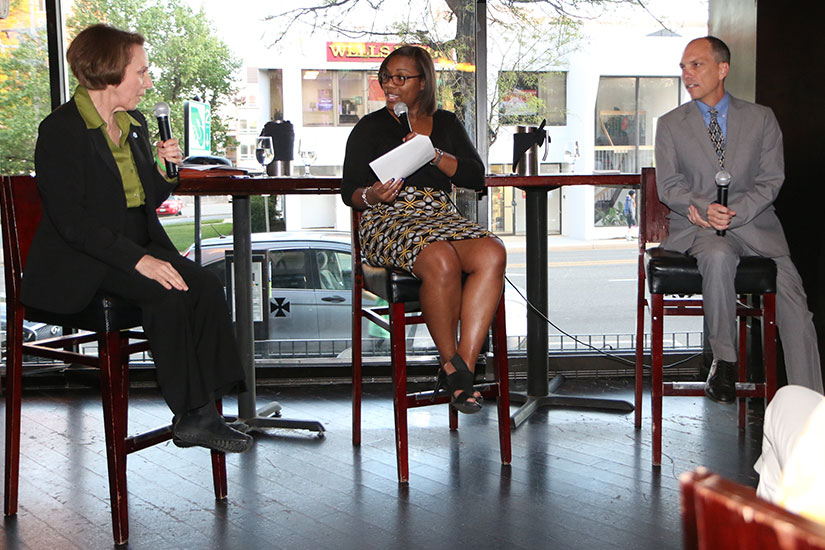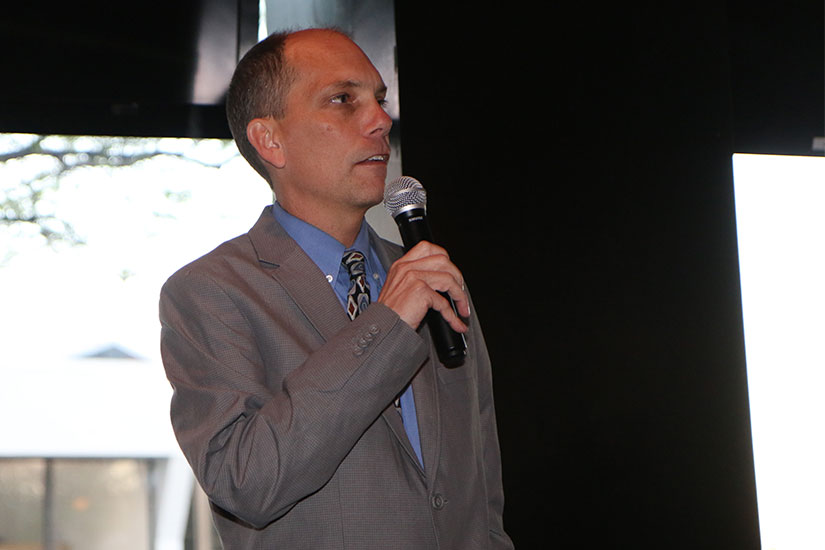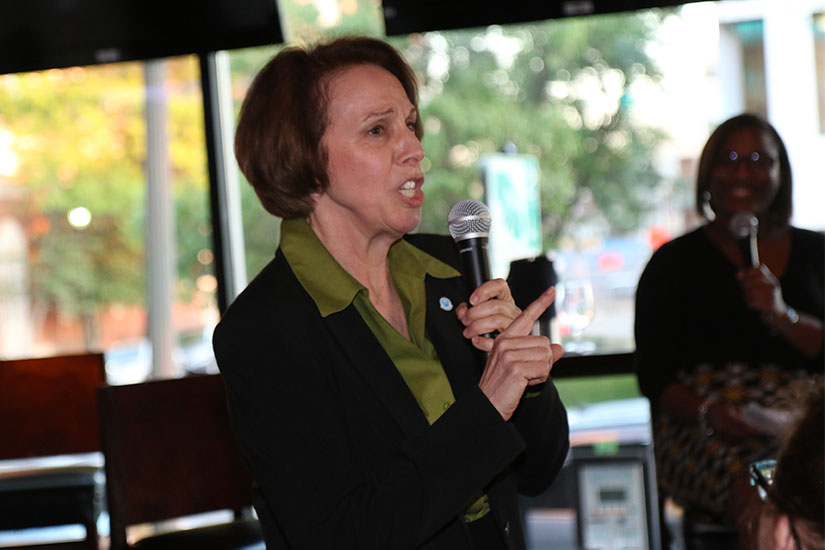A near-capacity crowd packed into Mad Rose Tavern in Clarendon Wednesday night for a Democratic showdown between County Board member Libby Garvey and primary challenger Erik Gutshall.
The Arlington Young Democrats-hosted debate was perhaps not the battle royale some were expecting, but there were a few pointed barbs from Gutshall and an assertive defense from Garvey of her record.
Gutshall started his line of attack before the debate even started, by CCing news outlets that morning on a letter to Garvey, questioning why former Republican Congressman Tom Davis donated $1,000 to her campaign. (In 2014, Davis also donated $1,000 to the campaign of independent County Board member John Vihstadt, who Garvey endorsed over Democrat Alan Howze.)
“I was shocked to learn that someone running to be the Democratic nominee would so openly solicit, and accept, campaign contributions from someone whose job and mission it was to defeat Democrats,” Gutshall wrote. He asked Garvey to sign a pledge to only support Democratic candidates and to reject campaign contributions from current or former Republican elected officials.
At the debate, Gutshall said it was “not acceptable” that Garvey had not signed the pledge, also citing her decision not to endorse Del. Rip Sullivan during his campaign.
“Absolutely, unequivocally, 100 percent I will support the Democrat, period,” Gutshall said.
Garvey, meanwhile, declined to make any absolute promises, saying she would make decisions based on “what is the right thing for Arlington… what is best for the people I serve.”
“Generally, that’s the Democrat,” she said. Her answer was followed by a couple loud boos from the crowd.
Gutshall attempted to re-litigate the streetcar battle, saying that Garvey “has sat on the sidelines” since she and Vihstadt helped to scuttle the project, which would have brought light rail transit to Columbia Pike. (The county has said an alternative transit plan will be coming this year.)
“We don’t have the transit that’s there to meet the needs of density” along Columbia Pike, said Gutshall. “We have the right to expect more and do better.”
Garvey said that until January, when she took over the County Board chairmanship, she “did not have the votes” to push a Bus Rapid Transit plan for the Pike. With the addition of like-minded Democrats Katie Cristol and Christian Dorsey this year, she said the County Board is functioning well as a team.
“Your board is a very exciting board right now,” she said. “I have done a lot since January. I would like to build on this experience and build on this work.”
Gutshall accused Garvey of abandoning the infrastructure investment mindset that led previous generations of local Democratic leaders to support, for instance, the building of the Metrorail system.
“Progress comes by investing in the future,” he said. “The main reason I’m running here is that I have heard rhetoric that we should turn and look inward and that we cannot afford to meet these challenges.”
Gutshall said Garvey, as a long-time School Board member before joining the County Board, bears some responsibility for the current capacity crunch at Arlington Public Schools.
Gutshall says his three daughters, all APS students, are “suffering from some of those consequences” from overcrowded schools due to planning that was “far too reactionary.”
Garvey, in response, said it was not clear during the previous decade that Arlington would experience the current school population boom. When the projections became clear Garvey said she championed the building of new schools, pointing to her quotes in a January 2011 ARLnow.com article.
Capacity challenges aside, Garvey said APS is “among the best school systems in the country” and “our teachers are among the highest paid in Virginia.”
“Nobody can say they’re more for schools than I am,” she asserted, also pointing to her lone vote to proceed with the building of a new elementary school on the Thomas Jefferson Middle School site in January 2015. (The school was ultimately approved in December, after a public process to address concerns of park advocates.)
Gutshall attributed school growth to more families with kids staying in Arlington rather than moving further out to the suburbs. He attributed that, in part, to traffic.
“Commutes got worse and thankfully Arlington held the line on widening I-66,” he said.
(There’s now a plan to widen part of I-66, which both Gutshall and Garvey both oppose. Gutshall said Garvey should have supported an earlier compromise that promised to delay widening on I-66.)
Gutshall, a small business owner, said that the county could do more to support small businesses. He decried the amount of time it takes for his company to get permits — “I’ve experienced it first hand” — and said Arlington Economic Development is more oriented toward helping larger businesses.
“[AED is] very geared towards the types of businesses that are going to fill office buildings,” Gutshall said.
Garvey said the county has been making strides in better serving small businesses, but acknowledged that there’s more work to be done.
“We’re aware that small businesses are having issues,” she said, before inviting Gutshall to a small business summit in May that was originally championed by Vihstadt.
Asked about affordable housing, both Garvey and Gutshall both said they support the county’s affordable housing efforts.
Beyond directly funding the creation of affordable housing, Garvey said the county could be more flexible in allowing different types of living arrangements — presumably, things like basement apartments or accessory dwellings sometimes known as “granny flats.” She also emphasized the importance of better supporting the owners of market rate affordable housing complexes, to encourage owners to keep such complexes affordable.
“We can’t build our way out of our affordable housing issue,” Garvey said. “I don’t know anywhere they’ve solved the affordable housing issue in a place where land is constrained and everyone wants to live there.”
Gutshall pounced on Garvey’s use of the word “flexibility.”
“Sometimes flexibility is just another word for give developers whatever they want,” he said. “If developers left to their own devices would create great places, then Tysons Corner would be a great place.”
He said county planners should focus on serving the “missing middle” — those who can’t afford Arlington’s pricy housing but make too much to qualify for dedicated affordable housing.
Gutshall, who serves on the Arlington Planning Commission, advocated increasing funding to the county’s planning division. He emphasized the value of “medium scale, neighborhood density” housing.
Garvey, who mostly avoided referencing her opponent during the debate, did sneak in one subtle dig near the end of the event. After Gutshall criticized Garvey’s last-minute approval of a “blue ribbon panel” to help advise the Board on county priorities — he called it a “magical six-person panel” — Garvey discussed the new-for-2016 video livestreaming of planning and transportation commission meetings.
“I didn’t have the votes to do it earlier,” Garvey said. “I’m glad that you support it Erik because I know that the Planning Commission was totally against it and fought it pretty hard.”
In her closing remarks, Garvey invited the audience to watch County Board meetings this year, suggesting that even among partisans the heterogeneity of ideas on the Board should be viewed in a positive light.
“Each meeting has gotten better,” she said. “We are clicking as a team… we have debates, we really discuss things, we’re exchanging ideas. That makes us stronger.”
Gutshall, for his part, said he would bring a future-oriented vision to the Board that he says is lacking now.
“Are we going to double down on what served us well?” he asked. “I know what it means to get results. I’ve got the vision… I believe we can all work together and meet our challenges with solutions for tomorrow.”
The Arlington County Board primary will be held on June 14.




